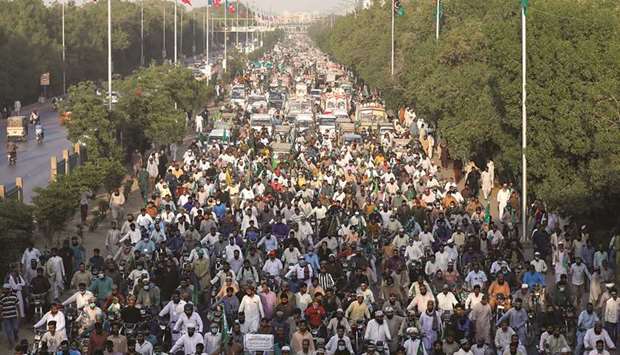Pakistan has banned public political rallies after recording its highest daily coronavirus infections since July for four days running.
The Covid-19 respiratory disease is caused by the coronavirus.
Several huge religious and anti-government public rallies have been held in major cities in recent weeks.
Prime Minister Imran Khan announced the ban, explaining that hospitals would be overwhelmed as they were in June, if people do not act responsibly.
“We have decided to ban public gatherings in the country, including ours planned over the weekend, as large crowds help in the spread of the coronavirus,” he said on national television.
After a peak of over 6,800 daily infections in June, the number fell to a low of 213 in August, and remained below 700 for most of the last three months.
“No one followed safety precautions and we are seeing the end-result,” Dr Seemin Jamali, executive director of Jinnah Postgraduate Medical Center in Karachi, told Reuters. “It is high time people realise, or we will continue to suffer,”
The country has registered a total 359,032 coronavirus cases and 7,160 deaths.
Pakistan has witnessed a huge spike in the positivity rate of Covid-19 since July, climbing up to 7.21%.
As per the National Command and Operation Centre, out of 29,511 tests across the country – much below its daily test capacity of 74,227 – 2,128 came positive, while 19 people lost their lives to the deadly virus.
The positivity rate, according to the official tally, is now 7.21%, the highest since July 22.
Alarmingly, the daily rate of deaths were being reported in double digits in the past week, while new cases have remained over the 2,000-mark for the last four days.
As per the World Health Organisation (WHO), the Pakistani cities and districts which have recorded the highest test positive ratio in the past few weeks are Multan, Rawalpindi, Mirpur, Muzaffarabad, Hyderabad and Karachi.
Meanwhile, a meeting of education ministers yesterday, chaired by Federal Education Minister Shafqat Mahmood, has deferred the decision on school closure and early and extended winter vacations.
In his remarks on the occasion, Mahmood said that the final decision regarding winter vacation and closure of schools will be taken in the next meeting of interprovincial education ministers on November 23.
Sindh Chief Minister Murad Ali Shah is the latest public figure to test positive for coronavirus.
According to Sindh Chief Minister House, Shah had a mild fever on Friday and was tested for the novel coronavirus.
His test result came back positive the same day, the Chief Minister House tweeted.
On the advice of his doctors, Shah has gone into isolation.
Last week, Pakistan Peoples Party (PPP) leader Qamar Zaman Kaira and Pakistan Muslim League – Nawaz (PML-N)’s Captain (retired) Safdar tested positive for the coronavirus while campaigning for their parties in Gilgit-Baltistan.
These leaders are among several politicians and lawmakers who have tested positive for the virus since the pandemic first emerged in Pakistan.
Sindh Governor Imran Ismail, National Assembly Speaker Asad Qaiser, Railways Minister Sheikh Rashid, PPP leader Saeed Ghani, PML-N president Shahbaz Sharif, former prime minister Shahid Khaqan Abbasi, Foreign Minister Shah Mahmood Qureshi, and Khyber Pakhtunkhwa Health Minister Taimur Jhagra contracted the virus and have now recovered.
Last week, Pakistan lost Peshawar High Court Chief Justice Waqar Seth and PPP’s senior politician Jam Madad Ali to the coronavirus.

This picture taken earlier this month shows supporters of religious and political party Tehreek-e-Labaik Pakistan (TLP) during a protest in Karachi.
